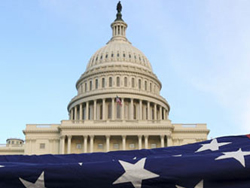U.S. Congress: reconciliation or continued bickering?
Add to that some of the firebrand tea partiers that won in their districts -- so far 40 in the House and five in the Senate -- and you have a formula for a polarized Congress, some experts said.
 |
In the weeks and months leading up to the elections, Democrats argued to continue cuts for everyone except for top earners. Republicans want to extend them across the board.
Obama was not specific on how he would compromise on the issue, but some experts noted that a third option exists -- that of a temporary extension of cuts for all earners.
After the tax issue is resolved, however, Republicans may send budget and appropriations bills to the president that spend less than he wants, which could spur a battle over spending, some experts said.
Many Democrats argue that spending is necessary to stimulate the economy in this harsh economic environment, while Republicans fret over the massive deficit.
The GOP has also given much lip service to repealing Obama's health care reforms, over which the two parties fought a bitter battle last year.
Darrell M. West, director of Governance Studies at the Brookings Institution, said Republicans may attempt to repeal Obama's health care reforms, which were the source of heated and bitter debate between the two parties last year.
A repeal of the overhaul, however, will never make it through the Senate. If it did, the president would veto it, West said.
Fortier said Republicans are likely to talk about repealing healthcare, but repealing the entire overhaul is unlikely, although some pieces of it that are unpopular with voters might come to a vote. Some may get through Congress and others might not.
As health care reform is phased in over the next several years, Congress could see continuing fights over its funding, among other aspects of the bill, he said.
Aids of John Boehner, R., Ohio, the newly elected speaker of the House as of Tuesday, told The New York Times that his top priorities would be to create jobs and cut spending, but the two parties are at odds over how to achieve those objectives, and that could lead to strife.
Disappointed voters expect more of the same
Whether Obama's statements on Wednesday are a harbinger of more cooperation, or whether Congress will return to its partisan ways, remains unknown.
In any case, voters are already showing signs of pessimism over the GOP victory.
Rasmussen, a polling company, found that 59 percent of likely U. S. voters think it is at least somewhat likely that most voters will be disappointed with Republicans in Congress before the next national elections. That figure includes 38 percent who say it is very likely, the company said.
 0
0 







Go to Forum >>0 Comments